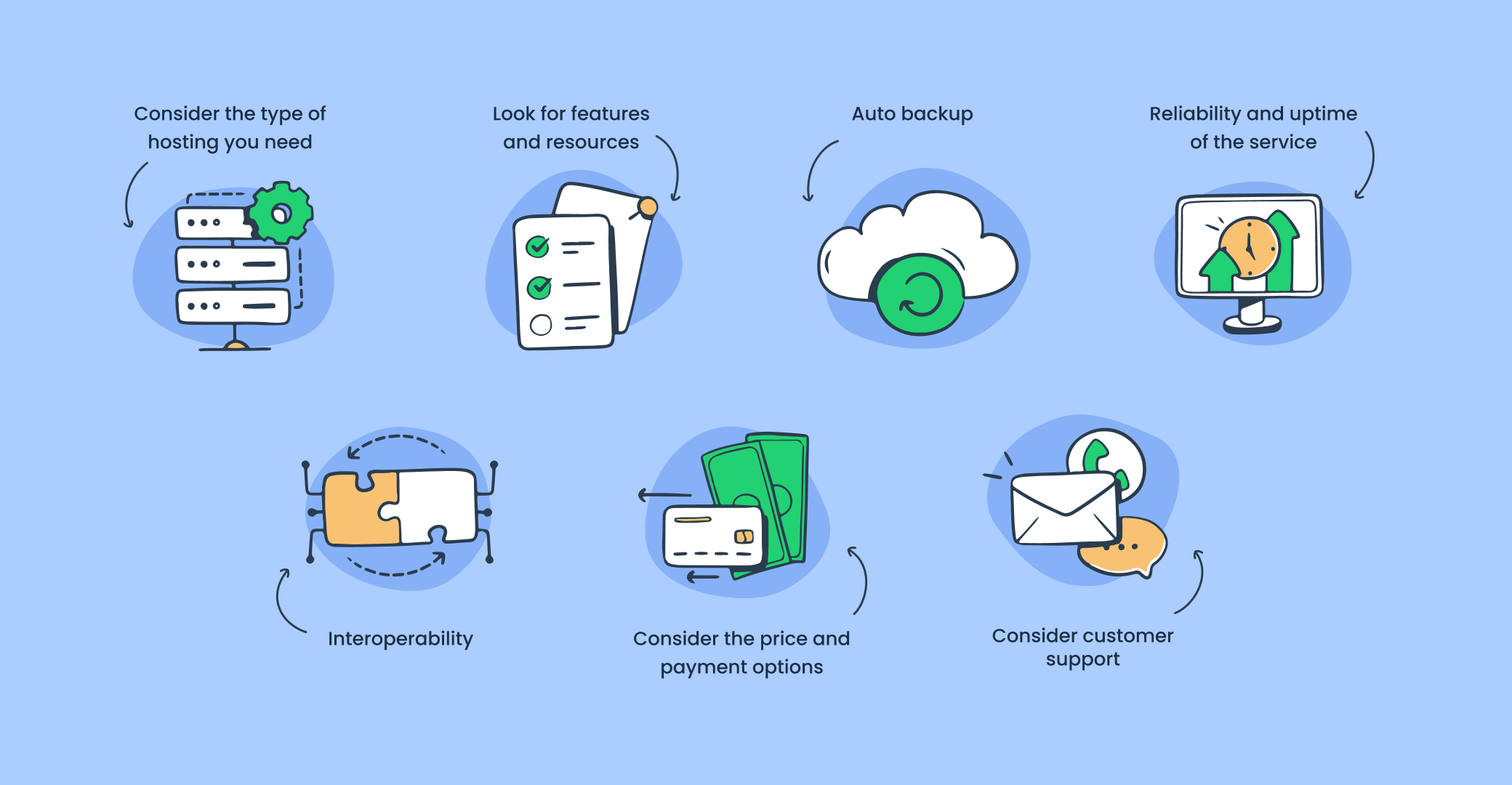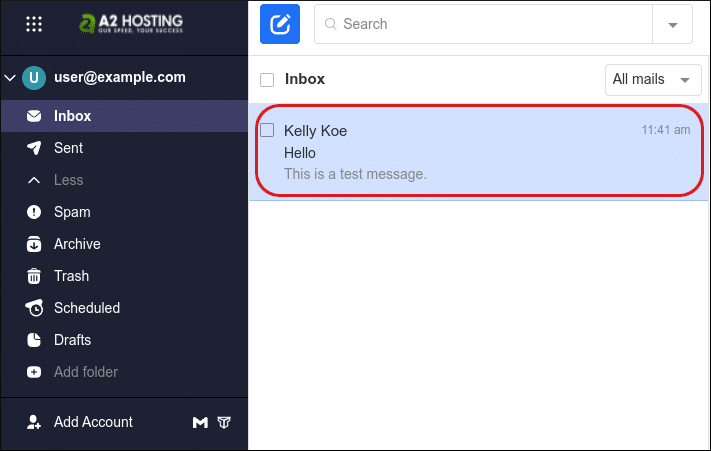Web hosting and email hosting are two different services, with the former being essential for individuals and businesses looking to host a website and the latter being the best option for those looking to host email accounts. Still, it can be challenging to know which type of hosting is right for your needs and pick a provider with so many available, all offering different plans.
In this guide, we’ll provide a complete overview of web hosting and email hosting, including the key differences between the two, best uses for each, and tips for choosing the right provider. So, if you’re interested in learning more, keep reading!
What is web hosting?
Through web hosting, space on a server is provided, allowing website owners to store files and data so users can access and view their websites over the internet.
When a user wants to view a website hosted on a server, they simply need to type in an address (URL) into their web browser, and the server will then send the website’s content to the user’s device.
Within a web hosting plan or PHP hosting plan, other necessary tools and technologies are also included, along with server space.
What is email hosting?
As opposed to web hosting, which lends space on a server for website files and data, email hosting allows the management of email services by organizations and individuals. This facilitates sending and receiving emails under a custom domain rather than a generic one provided by email services such as Gmail or Yahoo.
An email hosting provider will usually offer a range of features to its users, including web-based email access, email forwarding, email aliases, and support for popular email protocols such as POP3 and IMAP. What’s more, depending on the email hosting provider you go for, you might also receive additional security and privacy features like spam filtering and virus scanning intended to help protect against unwanted and potentially harmful email messages.
The key differences between web hosting and email hosting
With the general definitions of web hosting and email hosting covered, you should now be able to differentiate between the two. But if you need a few more pointers, here are 5 things you should pay attention to when trying to figure out whether a service is offering web or email hosting:
| Web hosting | Email hosting | |
| Content type stored | Website files and content | Email messages and data |
| Basic features | Website storage space and bandwidth | Email accounts and email server software |
| Plans and pricing | (Typically) A range of plans with different storage and bandwidth limits, as well as features | (Typically) A range of plans with different storage and email account number limits |
| Management | Managed by the web hosting provider | Managed by the user or the provider, depending on the level of service and control desired |
| Importance | Important for the performance, reliability, and security of a website | Important for the security and accessibility of email accounts and messages |
Factors to consider when choosing a hosting provider
As mentioned in the intro, picking a hosting provider, be it web or email, can prove to be a real challenge. That is why we came up with a list of factors you need to consider before signing up for the services of a specific one:

Type – Most hosting providers offer different types of hosting, such as shared hosting, dedicated hosting, and VPS (Virtual Private Server) hosting.
Each of these hosting types has its own characteristics and a type of website it’s best suited for. For more details, please refer to the table below:
| Hosting type | Description | Best suited for |
| Shared hosting | Hosts multiple websites on the same server, where the websites share resources such as memory, processing power, and storage | Small websites with low traffic |
| Dedicated hosting | Hosts a single website where the website has exclusive use of the server resources, such as memory, processing power, and storage | Larger websites with high traffic |
| VPS hosting | A physical server partitioned into multiple virtual servers using virtualization technology. Each virtual server functions as a separate entity with its own operating system, resources, and software. | Websites in need of traffic and resource scalability |
Features and resources – Hosting providers create plans with a set of features and resources included in each, such as:
- storage and bandwidth
- creation of websites and email accounts
- tools for website building and email management
- and more
Be realistic about your needs when it comes to what is listed above in order to pick the provider and plan best suited for you.
Auto backup – If within your hosting plan, you receive an auto backup feature, this will ensure that the latest version of your data is stored in a safe and secure place. So if something goes wrong with your website or application. using auto backup, you can easily restore it to a previous state which can save a lot of time and effort.
Reliability and uptime – Based on the reliability and uptime advertised by a hosting provider, you can project how available your website will be to users if you sign up for the services of that specific provider. A website hosted by a provider with high uptime has a high uptime itself and a better user experience than a website hosted by a provider with low uptime.
You can easily monitor the performance and uptime of your website with the help of a monitoring tool like Atatus, which offers various features such as application performance monitoring, real user monitoring, synthetic monitoring, and much more.
Speed – A hosting provider that offers fast server speeds can facilitate the fast loading of your website – a factor crucial for a great user experience.
Security – Robust security measures implemented by a hosting provider are what will protect your website and its visitors. These security measures can include things such as SSL certificates, regular backups, firewalls, and more.
Scalability – The scalability of a hosting provider’s services allows websites and applications to adjust their resource usage as needed in order to meet the changing demands of their users.
For example, imagine a small e-commerce website that uses a single web server and a single database server providing enough capacity to handle a few hundred transactions per day.
As this website grows and attracts more customers, its number of transactions increases. So, at some point, with its existent resource usage limits, the website may start to experience slowdowns or other performance issues.
To resolve this, the hosting provider could scale up the website’s resource usage limits by adding additional web servers and/or database servers, thus increasing the amount of storage and/or bandwidth available to the website. This would then allow the website to handle the increased number of transactions without experiencing any issues.
Interoperability – A good hosting provider should be using technologies compatible with the systems you are using, as well as third-party systems you plan to integrate with. In other words, it should have an interoperable technology stack.
Pricing and payment options – Pricing and payment options differ from hosting provider to hosting provider, with some offering monthly or annual plans and others longer-term plans at discounted prices. The best option for you will depend on your budget and your payment preferences.
Customer support – Good hosting providers are characterized by offering good customer support. The provider of your choice should offer multiple support channels (phone, email, chat, etc.) or use a UCaaS system that unites all communication channels within one unified platform, and have a track record of responding to customer inquiries promptly and effectively.
Should web hosting and email hosting be used together?
Okay, now that we have the basics out of the way, it’s time to address a question that often arises – is using web hosting and email hosting simultaneously a necessity?
The simple answer to this question is, “It all depends on your needs”.
You see, if you want to create a website and you don’t need email addresses under the same custom domain name, you will only need web hosting for the website to be functional and accessible over the internet.
On the other hand, if you simply want to use and manage email accounts, then you will only need email hosting.
That being said, if you want to create a website for a business and need email addresses under the same custom domain name to send out communications, contact customers/partners, offer support, etc., then you will need both web and email hosting.
You can decide to purchase web hosting and email hosting from separate providers, but for the sake of convenience, you can also find a provider that offers web hosting as well as email hosting as part of their services. This is totally up to you!
Bonus tip: Use the Mailtrap Email Delivery Platform along with your email hosting for just-in-time email delivery
Getting web hosting or email hosting is just one part of the puzzle. And depending on what project you are working on, you might need a range of other tools or services as well.
Unfortunately, we can’t give enough recommendations to cover all possible needs the readers of this article might have. But what we can do is introduce you to a solution that will take your email sending to the next level – Mailtrap Email Delivery Platform.
Intended for businesses and individuals, Mailtrap Email Delivery Platform is a solution that covers all email-related needs in one place: testing, sending, and in-depth tracking for control over email infrastructure functionality and performance.
Besides an end-to-end sending solution, users of this platform can also count on having a number of benefits, including a quality email infrastructure with high deliverability rates by design, free and quick support/guidance, and much more.
For a quick yet informative overview of the platform, make sure to check out the video below:
And for more in-depth technical information, please visit the Mailtrap knowledgebase.
Wrapping up
In this article, we’ve covered the most important ins and outs of web and email hosting. So now, after reading it, you should be able to differentiate between the two with ease and understand that both are essential aspects of having a presence on the internet. On top of that, by using the “Factors to consider when choosing a hosting provider” section of this article as a guide, you should also be able to choose a hosting provider that fits your needs.
We hope you use the information provided in this article to your advantage and make finding a hosting provider a hassle-free experience!
https://mailtrap.io/blog/web-hosting-vs-email-hosting/




![Top 6 Server Management Software and Tools Compared [2023]](https://ta-relay-public-files-prod.s3.us-east-2.amazonaws.com/icp/product_images/23db1d70048ad120d46c9ea0e43f22e5.png)

